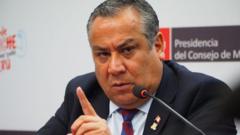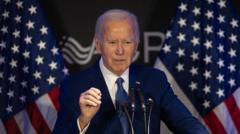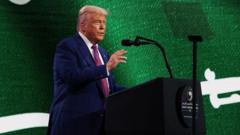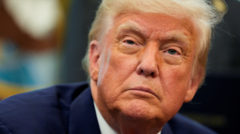President Trump's intention to accept a $400 million luxury plane as a gift from Qatar is stirring legal and political controversy, with critics labeling the move as potentially unconstitutional and illegal. While the White House navigates the complexities of the situation, the implications of accepting such a high-value gift are being analyzed by experts and sparking debate within Washington.
Controversy Erupts Over Trump's Potential Acceptance of $400 Million Gift Plane
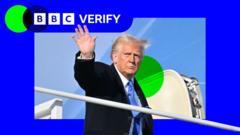
Controversy Erupts Over Trump's Potential Acceptance of $400 Million Gift Plane
Legal experts debate the ramifications as President Trump considers a Boeing jet gift from Qatar amid accusations of impropriety.
US President Donald Trump has sparked a heated debate by expressing interest in accepting a luxury airplane valued at approximately $400 million from the Qatari royal family. He referred to the proposed gift as "a great gesture" and stated that it would be "foolish" to decline it. However, the idea has prompted a strong backlash, notably from some Democratic lawmakers who argue that such an acceptance would be illegal under U.S. law. The White House, on the other hand, insists that the transaction is legal.
As Trump embarks on a diplomatic mission across the Middle East, including a stop in Qatar, speculation about the plane continues to swirl. Initially reported by various media outlets, the Boeing jumbo jet is said to be intended as a temporary replacement for the aging Air Force One, pending upgrades to meet official safety standards. On social media, Trump emphasized this arrangement as beneficial and transparent, further igniting discussions around the implications of accepting foreign gifts.
Criticism has mounted not just from Democrats but also some members of Trump's own base. Questions regarding the legality of this acceptance hinge on a clause in the U.S. Constitution which restricts elected officials from accepting gifts from foreign leaders without congressional approval—an action deemed crucial to prevent corruption and foreign influence. Experts, including constitutional lawyers and historians, underscored the constitutional and ethical gravity of this potential gift.
In addition to concerns about legality, the timeline for retrofitting the jet points to a scenario where it would unlikely be operational until near the end of Trump's term. Once he leaves office, the jet is projected to be placed in his presidential library, though the particulars of such arrangements add layers of complexity to the legality debate.
While Trump maintains that he wouldn't utilize the jet post-presidency, critics fear that accepting the gift undermines ethical standards. The Justice Department has been reported as drafting a memo presenting arguments for the legality of the deal, which remains under wraps.
Amid this backdrop, President Trump is also promoting business interests in the region, with his family pursuing lucrative projects in Qatar and nearby UAE. His sons are spearheading Trump Organization ventures which include golf courses and hotels—a further point of contention when considering potential conflicts of interest during his presidential duties.
The ongoing discussion both encapsulates legal nuances regarding foreign gifts and highlights the intertwined nature of Trump's business dealings and diplomatic efforts, reflecting a complex landscape where governance, ethics, and personal interests intersect.


